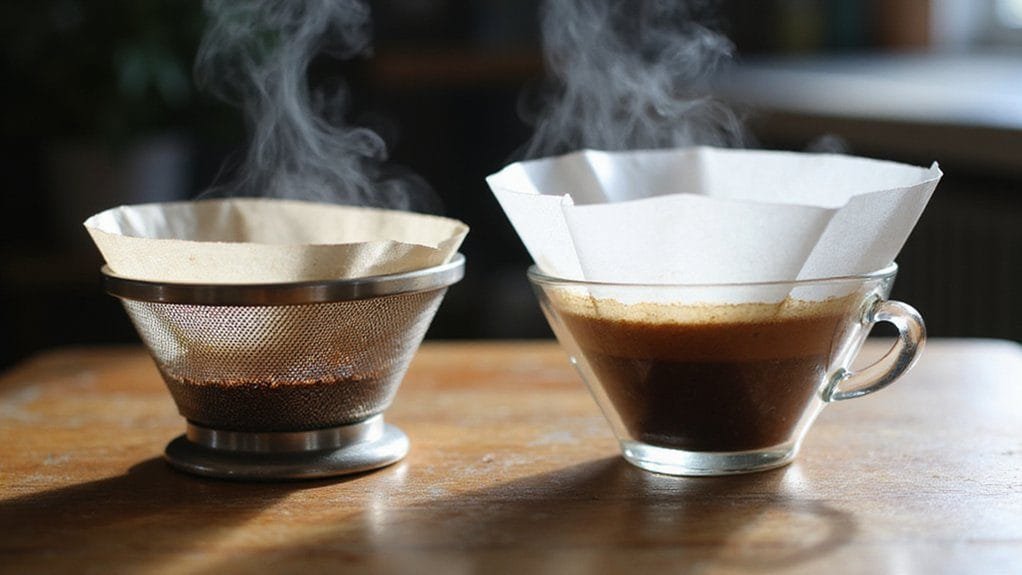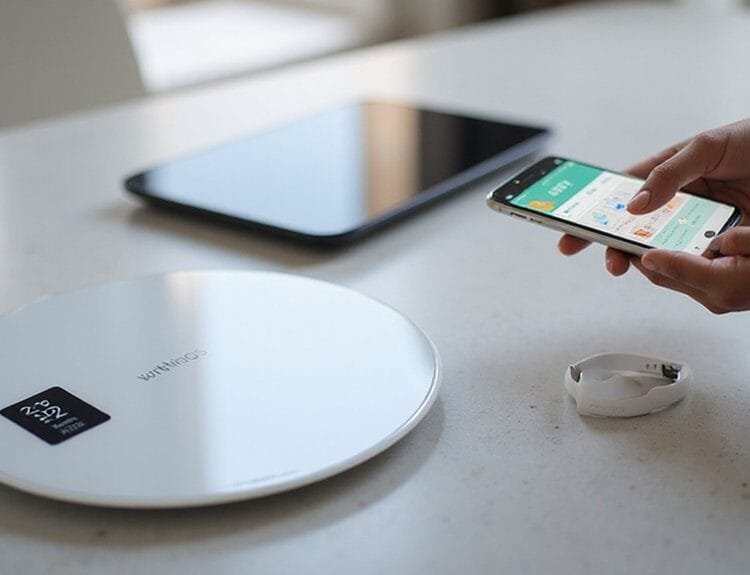Metal coffee filters let you experience a robust, full-bodied brew with rich oils and micro-grounds that paper filters trap. You’ll notice more complex flavor extraction and a syrupy texture compared to traditional paper options. The trade-off involves higher upfront costs but exceptional long-term sustainability. Your brewing technique and personal taste preferences ultimately determine the ideal filter choice. Keep exploring to uncover deeper brewing insights.
Key Takeaways
- Metal filters and mesh filters are often synonymous, both allowing oils and micro-grounds for a full-bodied coffee experience with rich, complex flavors.
- Metal/mesh filters provide superior durability, lasting decades compared to disposable paper filters, making them more economically and environmentally sustainable.
- Filtration design enables metal/mesh filters to retain more coffee oils, resulting in a syrupy texture and deeper taste profile compared to paper alternatives.
- Maintenance requirements include immediate post-brewing rinsing and periodic deep cleaning with vinegar solutions to preserve filter performance and prevent residue buildup.
- The choice between metal and mesh filters depends on personal preference for flavor intensity, with metal options delivering more robust and nuanced coffee characteristics.
Understanding Coffee Filter Fundamentals


At the heart of every great brew lies the coffee filters—a critical component that transforms ground beans into a delectable beverage. Understanding their fundamental role reveals how different filtration mechanisms profoundly influence your coffee’s final flavor profile. Metal filters, with their durable mesh construction, allow essential oils and fine particulates to pass through, delivering a robust and full-bodied taste. Conversely, paper filters trap these microscopic elements, producing a cleaner, lighter drink. When selecting between metal filters and alternative options, you’ll need to evaluate grind size, water temperature, and extraction dynamics. Each filter type presents unique brewing characteristics that can greatly impact taste, texture, and overall sensory experience. Your choice ultimately determines the nuanced complexity of your morning ritual.
Exploring Metal Coffee Filter Characteristics
Wire mesh composition defines the distinctive characteristics of metal coffee filters, setting them apart from traditional paper alternatives. You’ll find these filters crafted from intricately woven wire that allows oils and micro-grounds to permeate your brewed coffee, creating a distinctly full-bodied coffee experience. The intentional design enables more complex flavor extraction compared to disposable filters.
Metal coffee filters offer durability and sustainability, lasting potentially decades with appropriate maintenance. Their unique structure permits diterpenes like Cafestol and Kahweol to enter your brew, introducing potential nutritional complexities. While requiring slightly more cleaning effort—approximately 30-60 seconds post-use—they compensate through enhanced taste profiles and reduced environmental waste.
These filters fundamentally transform your brewing process, delivering a richer, more nuanced coffee experience.
Comparing Flavor Profiles and Brewing Techniques


While metal and paper coffee filters fundamentally transform brewing dynamics, their divergent characteristics greatly influence flavor extraction and sensory experience. Your brewing experience hinges on understanding these nuanced differences in coffee filters.
Key flavor profile discoveries include:
- Metal filters release rich, syrupy textures with heightened oil retention
- Paper filters deliver crisp, bright notes with remarkable clarity
- Grind size precision dramatically impacts extraction complexity
- Aroma intensity varies considerably between filter materials
Technical considerations demand meticulous attention to extraction variables. Metal filters permit more dissolved solids, creating a fuller-bodied brew with enhanced mouthfeel. Conversely, paper filters produce a cleaner, more refined taste by absorbing intricate oils. Your choice ultimately depends on personal preference, balancing between robust intensity and nuanced subtlety in your coffee’s sensory profile.
Sustainability and Long-Term Cost Considerations
Beyond the sensory nuances explored in flavor profiles, coffee filter selection reveals profound economic and environmental implications that merit rigorous examination. When evaluating sustainability and long-term cost, metal filters demonstrate exceptional value. While initial investment appears higher—approximately 550 times the cost of paper filters—a single metal filter can replace hundreds of disposable alternatives, dramatically reducing waste and ongoing expenses.
Your environmental footprint shrinks considerably with this choice. By shifting to a reusable metal filter, you’ll eliminate continuous filter purchases and minimize landfill contributions. Calculating the break-even point at roughly 1.5 years, metal filters become an environmentally friendly and economically prudent solution. The durability guarantees decades of use, transforming what initially seems like a premium purchase into a strategic, cost-effective investment in both personal finance and ecological responsibility.
Maintenance and Care for Different Filter Types


Three primary coffee filter types—metal, paper, and cloth—demand distinct maintenance protocols to preserve brewing quality and filter longevity. Metal filters require immediate post-brewing rinsing to prevent coffee oil and ground accumulation, guaranteeing peak performance and flavor retention. Proper maintenance varies greatly across filter materials:
- Metal filters: Deep clean periodically with vinegar solutions to remove stubborn residue and maintain mesh integrity
- Paper filters: Single-use design eliminates complex maintenance, though contributes to environmental waste
- Cloth filters: Demand thorough washing between brewing cycles to prevent flavor contamination
- Comprehensive approach: Regular inspection and proactive maintenance extend filter lifespan and brewing consistency
Your chosen filter’s maintenance strategy directly impacts coffee quality, equipment longevity, and overall brewing experience. Systematic care guarantees each brewing method delivers consistently exceptional results.
Selecting the Perfect Coffee Filter for Your Brewing Style
How do you navigate the intricate landscape of coffee filter selection? Your choice of coffee filters hinges on understanding how metal filters and personal preferences intersect with brewing dynamics. Metal filters deliver a robust, oil-rich extraction that enhances coffee’s inherent complexity, while paper alternatives provide a cleaner, more refined profile. Consider your brewing method’s compatibility—some systems optimize performance with specific filter types.
Analytical brewing demands precise filter selection. Evaluate your desired flavor intensity, environmental impact, and maintenance requirements. Metal filters offer sustainable, long-term usage with proper care, whereas paper filters provide convenience at the cost of disposability. Your grind size further influences extraction, with coarser grounds complementing metal filters and finer grinds enhancing paper filter performance.
Frequently Asked Questions
What Is the Best Material for Coffee Filter?
You’ll find the best coffee filter depends on your brewing method, desired flavor profile, and filter longevity. Stainless steel offers durability and rich taste, while paper provides cleaner extraction, balancing personal preference with technical brewing considerations.
Do Metal Coffee Filters Work Well?
Golly, you’ll find metal coffee filters excel in flavor profile and durability, offering consistent brewing time. They’re technically superior, allowing oils through while maintaining structural integrity, presenting a robust brewing method for discerning coffee enthusiasts.
Is Paper Coffee Filter Better Than Mesh?
You’ll find paper filters offer cleaner taste and health benefits, while mesh filters provide longevity. Consider your priorities: paper’s crisp flavor and reduced cholesterol-linked compounds versus mesh’s durability and fuller-bodied coffee profile.
Which Coffee Filter Shape Is Best?
Like a master conductor shaping musical notes, cone filters orchestrate your coffee’s flavor symphony. You’ll find they extract more complex tastes, offering superior brewing precision compared to basket shapes’ broader, less nuanced water flow.
Conclusion
When deciding between metal and mesh coffee filters, you’ll find each has unique advantages. Can you imagine the perfect cup tailored to your brewing preferences? Your choice depends on flavor complexity, environmental impact, and maintenance requirements. Metal filters offer durability and robust taste, while mesh provides fine filtration. Ultimately, your ideal filter balances personal brewing style, sustainability goals, and desired coffee experience.





